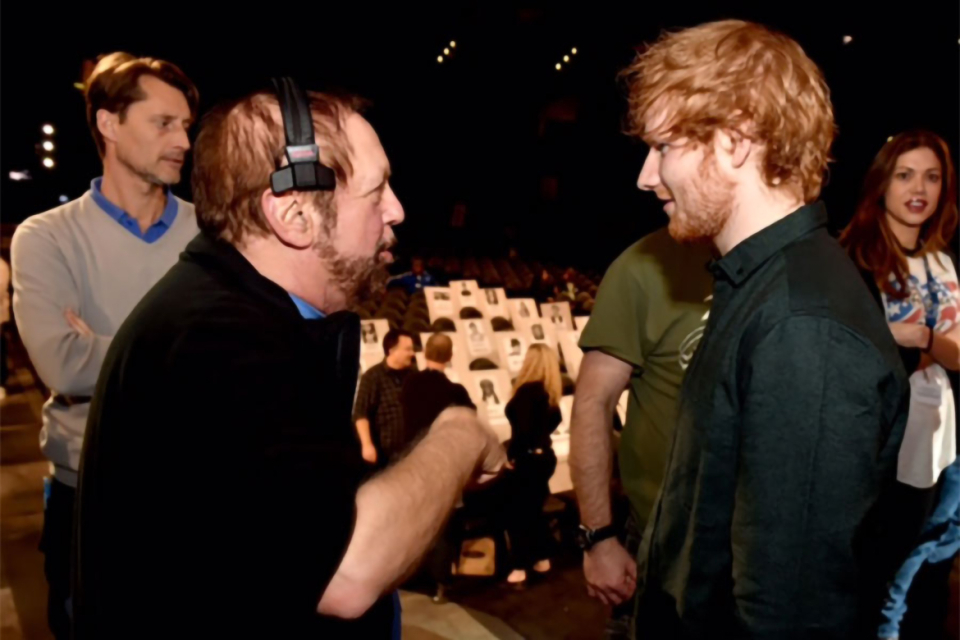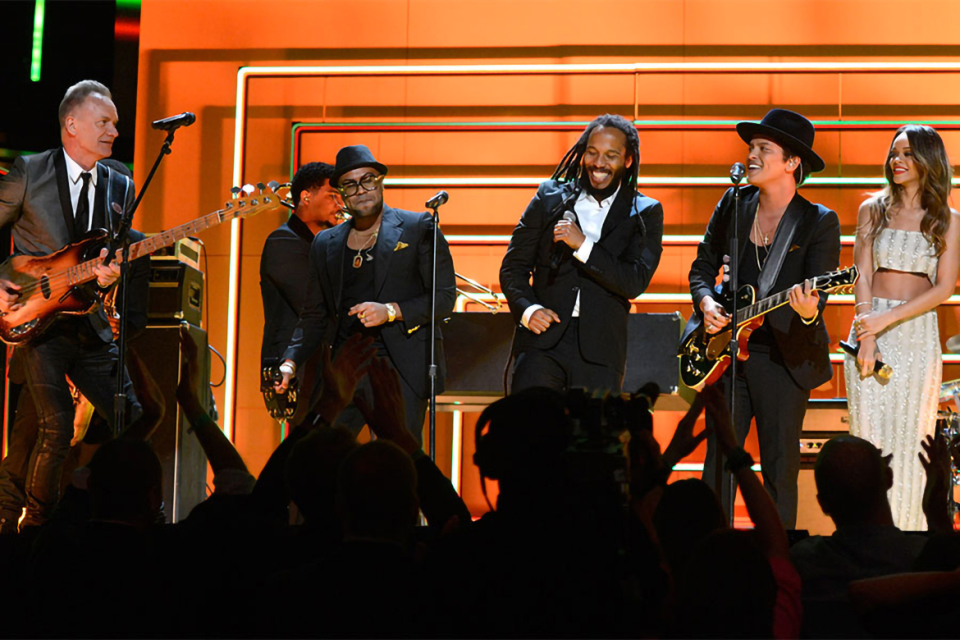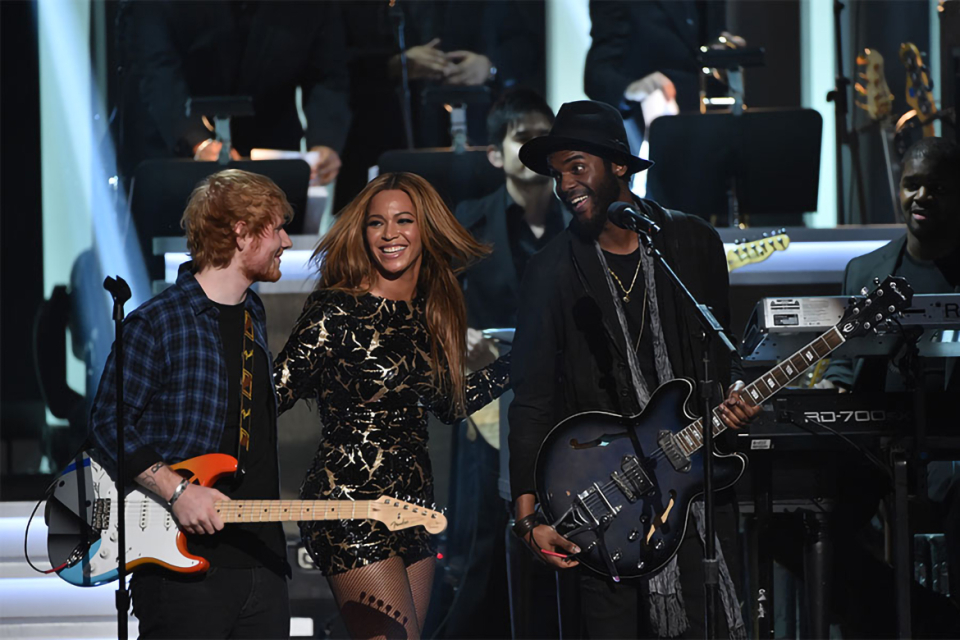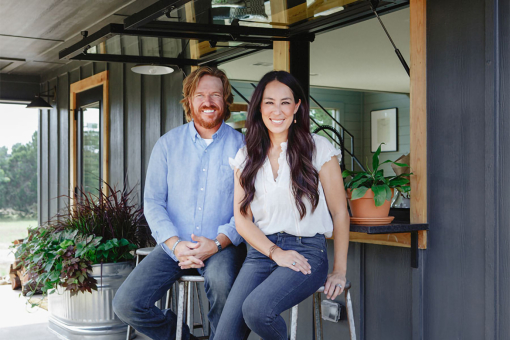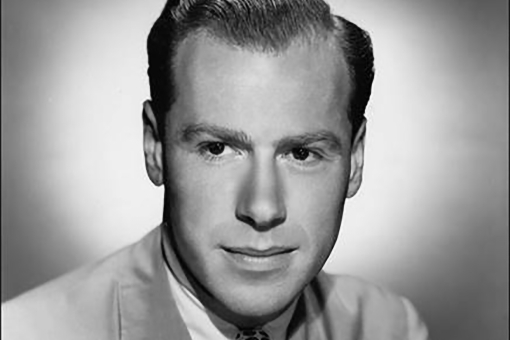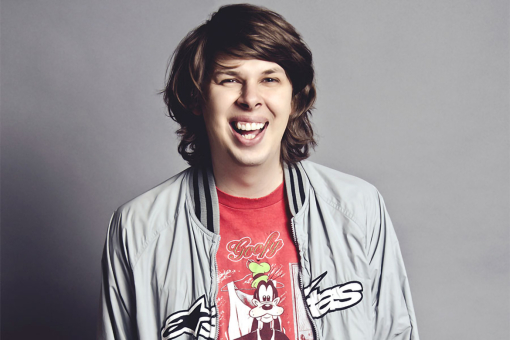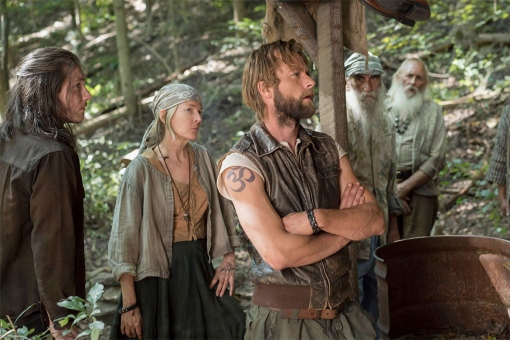Ken Ehrlich has been producing the Grammys for 35 years now, and has become known for delivering huge Grammys moments in what is essentially a one-time-only live concert event.
His work doesn’t stop at the Grammys, of course. In addition to countless specials, Ehrlich has also brought music fans to the White House during the Obama years, where he discovered that the former first couple are music fans of the first degree (in fact, he took a suggestion to train a camera on Barack and Michelle, who he said “sing every lyric” and are always the first to stand a clap.)
Music, he knows, is a touchstone, and live music is something even more special, which is why those moments are so important: Pairing artists in ways people might not expect can be career making, but also culture making, even more nowadays when fans take to social media to rehash every moment.
And, the Grammys make statements: from an actual ceremony wedding 34 couples – gay and straight – for same-sex marriage, to performances speaking out against rape to a fiery number from Kendrick Lamar in 2016 that was inspired by the Black Lives Matter movement, Ehrlich doesn’t shy away, and more often than not, says “Bring It On.”
In this second of a two-part story, we talk to him more about how he puts together the biggest night in music.
You’re known for using some artists with regularity – Beyoncé, Stevie Wonder, Sting, Rihanna, but you also have a rep for pairing up-and-comers with veterans. (In 2011, Ehrlich paired Mumford and Sons with Dylan and the resulting performance was thought to set fire to the band’s career.) How does that work?
That’s why I can’t plan out too far in advance because honestly I go through the nominations for [those new artists] and that’s what the Academy likes me to do. So I start there. That doesn’t mean I use them all but it means that I would hope, because there’s so many diverse categories -- whether Americana or the blues or Latin or R&B or occasionally classical, I’ll find something.
What I’ll do, not that I want to give this away to other shows but usually the first weekend after nominations come out and because I don’t have all the product or have to make quick calls to get it, I’ll get on YouTube or Google and spend Saturday and Sunday, morning to night, basically listening to things I haven’t heard before. Listening to things I have heard but hadn’t realized would work together.
Good artists borrow and great artists steal and for example, right now, I went on YouTube and put in names of two artists who don’t deserve solo spots on the show but I put in both names to see what came up and what came up was a mash-up of two songs done by some kids who thought it was cool. My ego would prefer I come up with those ideas without looking online but still.
So then I have something I like, that I think would be advantageous to put on the show. Do I think these are acts that will be around in 10 years? I don’t know. But the show also needs to have currency.
So the next step is going to each act, sometimes I’m more delicate and sometimes more direct and say, “You’re not going to get your own slot on the show but would you consider…” and then I pop the question. Sometimes they say, “you’re crazy and we had the biggest record of the year and why would we be on with that act?”
And sometimes they’re up for it?
Sometimes it’s a process. It might take a week, it might take 10 days. I say, look guys I have a deadline and walk away.
Sounds like good advice for dating – with these egos.
We’re just a big musical Tinder. Swipe left, swipe right.
I could tell you, I’ve got story after story.
Here’s one. Bruno Mars, three or four years ago after his album came out, I was doing a little interview with him for [a Whitney Houston tribute show]. His record was not nominated but I’d gotten an advance and loved several songs on the record, especially “Locked Out of Heaven.”
I went to see him somewhere in Burbank and we finished the interview and we were talking. He said, “I’m not going to do the Grammys this year. The record is not nominated but I want to do it next year. Because next year, I’ll own the Grammys.” So I said, “Okay, but if you were to do the Grammys, what song would you want to do?” And he said, well, I love “Locked Out of Heaven.” I told him I did, too.
I got in my car and I’m driving across the Valley to my office. The first call I made was to Kathy Schenker, who reps Sting. I said, “Sting could pick the song but have you heard, ‘Locked Out of Heaven’?” I said I would love to get them together to do the song and maybe one of Sting’s. She said absolutely.
I hung up, a little bolder, and called Rihanna’s manager and said I had Sting and Bruno – not exactly the truth – but I knew that Rihanna loved the Marleys. So I said we’re doing “Locked Out of Heaven” and a Sting song and have Rihanna there to do a Marleys song, and before I got off the 101, she called back and said she was in.
The next day, I came to the office, tracked down a couple of the Marleys I thought would want to do this. Then, I talked to Bruno and said, “I know you said you didn’t want to do the Grammys but what do you think about if we did ‘Locked Out of Heaven’ with you, Sting, Rihanna and a couple of Marleys?” Silence on the phone. Then he said, “Ken if you can do that, I’m in.”
The irony of this whole thing as I told him a few weeks ago when he was playing me his new album, I asked if he remembered the whole thing and what happened. Well, that performance was so strong that the next year Bruno got the Super Bowl and they told him he couldn’t do the Grammys. (Because that year the Super Bowl would air ahead of the Grammys.) He said, “Yeah, Ken, sometimes things happen for a reason.”
Do you think you succeed due to persistence and optimism?
I’m very fond of an expression that I’ve passed on to subsequent generations: “They’re not your friends.” There are exceptions and I need to make that clear: Celine and Rene are my friends but by and large they’re not.
If you work with them and are kind of honest with them and don’t try to hide things and there are no surprises and you deliver what you promise then, not all the time, but most of the time you have a better chance of getting things to work for you.
That’s my second favorite expression. My favorite is Irving Azoff: “We accomplish the impossible for the ungrateful.”
In some cases, it seems even the audience would benefit from knowing all that goes into this show. So, between the wedding you did with Macklemore and Madonna, etc, Kendrick Lamar’s 2016 performance that resonated with the Black Lives Matter movement and other things of that ilk, the Grammys seem to make statements more than other shows do. How do you approach that and what are you doing right now, in these times?
I actually prefer not to say we make statements but I prefer to say we allow artists to make statements. It’s not just about that legalese, I just firmly believe as you graciously point out, this show is the document of record for the music industry. Who else is going to do this if we don’t? We have to allow artists to express themselves creatively and artistically.
So I would say we encourage it and I would say that we honestly – it hasn't always been that way. I was a child of the ‘60s and I grew up in the protest movement and I was a little too old to be a hippie but I’ve felt like one.
But really in the last five or 10 years, maybe because I’ve felt confident enough in the show and in the support we get from primarily from the network but secondarily from the Academy, I can walk in to [CBS] and say, “hey, we’re going to marry 35 couples of different genders, races, orientations ,blah blah blah and I just want to know you’re going to be okay with and support it because it’s going to be controversial.”
And I will tell you that was one of the easiest discussions we’ve ever had.
A couple things we’re looking at this year, one is safe and one is a little more risky and I don’t know if we’ll get to either of them.
But in the ‘60s when my musical boundaries were kind of enlarged by college, the artists we kind of respected were the Bob Dylans and Joan Baezs and Joni Mitchells, the Beatles. In the ‘70s and ‘80s, we kind of went the other way – with disco and hair metal.
And when we turned to the aughts and maybe even before…
Grunge in the 90s maybe.
Yes. There was a new generation of artists that didn’t have a problem saying something. For a while there, I’d hear from artists who didn’t want to risk anything – I’ve been involved with campaigns for Obama and Hillary – this was before them Then it became a lot easier when the artist base wanted to stand up for what they believed in and we gave them a platform and maybe helped guide them.
I get the sense that the White House concerts you’ve done won’t be continuing with the new administration.
No, I don’t think so. I’ve been thinking several times in the last few weeks, how lucky we were to be in that climate for the last eight years. The Obamas were so appreciative and loved music so much.
Okay, you’re making me sad. And we should get back to the Grammys. I know you’re waiting on people to confirm now, but as it gets closer, can you give me an idea of what you’re doing in the lead-up to the show, how it comes together?
Working backwards: The show is on Sunday, Feb. 12 and we’re also working on a Grammys Salute show two nights after but I can’t say much on that.
So, on the day of, we have dress [from] 10 to 2 at Staples and across the street we announced the categories we don’t do on air, which is most of them, at the Microsoft Center. We go live at 5.
The day before, Saturday, is the roughest day because it’s the day everyone wants to come and rehearse. With two stages we can rehearse on one, while while we do set on the other. Saturday, I will say we do 7 performances, maybe 8. It’s a 16-hour day.
Friday, if we do eight performances on Saturday, we do 10 on Friday, from 10 a.m. to 10 p.m.
Thursday, is usually the hardest time to get acts to come in and we start in the afternoon. In the morning, we do cue-to-cue, and crew rehearsal.
Monday to Wednesday, depending on how complicated some of the Grammy moment multi-artist performances are, we go to a facility in Burbank.
In any given year, we’ll be using 7 or 8 of [its 15 rehearsal rooms]. Artists come in early and we rehearse there. When they’re the keystone segments of the show, I like to get out there and see them rehearse. Those days can be hard. If it’s a medley and someone is late the other artists are thinking, “why am I here if she’s not?”
Do you have any advice or mantras you follow during all this?
I actually have a pretty large ego but it doesn’t extend to a monopoly on ideas. I have no problem consulting others. Over the years, I’ve called people if I need to or I’m not sure on something.
I call Dave Grohl when there’s something about hard rock from 1980 to now. I know a lot about a lot of music but I have gaps. I’ll say, “I’m thinking about this…” I wasn’t sure about AC/DC so I called him and he said. “You mean it’s possible they’ll do the show? Of course. What are you crazy?”
I bounce ideas off David Wild (Rolling Stone contributing editor and a Grammys writer for 15 years). I talk to Randy Lewis and Steve Hochman at the L.A. Times. These guys go out to every show.
And a lot is spending enough time on YouTube and Google. And a lot is my own music – I own thousands of albums on vinyl, CDs, mp3s.
It’s funny, when I talk to artists, I find that one of the things we share is there is not a moment in the day when I don’t hear music in my head. 24 hours a day, I just hear music. Some of it is relevant to what we’re doing, some is not.
Last night there was a dinner at the club I belong to and my wife volunteered me to cook for the staff. We’re in the kitchen, and I hear “Brandi” by Looking Glass. A neighbor was standing next to me and I said, “do you hear that?” She said, “I hate that song, I’ve heard it 5,000 times and the 5,001st, I said I never want to hear it again.”
And I said, I did a show with Looking Glass and I remember loving the song. As bad a song as that is, I loved it and I kept hearing that the rest of the night.
And, I right now am listening to some acts that are new to me. I’m listening to Chance the Rapper, Sturgill Simpson, Anderson .Paak. Right now, it’s mostly Grammy stuff but then as I was coming in I heard “Searching” by The Coasters, “It’s Only Make Believe” by Conway Twitty.
And sometimes I just play roulette with the car radio: from a Sinatra station to college stuff I’m not going to hear anywhere else.
As a music lover, what do you want fans to get out of the show?
I love to think that the Grammys for a lot of people are about discovery. When I think about the majority of the people who watch the show, they’re people who are really into music and they’re really looking for a good musical experience.
But I also believe that, because the CBS audience is still a little older, and as we all know people pass through music in their lives -- when you’re a kid, music is important to you, when you’re a teenager you find stuff you can make out to and drive around with and do drugs to, then you get married and have kids and you’re too busy and you play the kids’ stuff and then you kind of drop off the map and you start to listen to the stuff you did when you were a kid and you don’t stay with the new stuff.
So that’s part of what the Grammys is, to discover artists that might be new to them. From Bruno Mars to Lady Gaga, Beyoncé, the ballad side of Rihanna. That’s what we do. I think that a lot of people watch the show might see some of these acts on other shows but this is the only time they’re going see them on a stage bigger than this room.
And I want them to remember it.
For Part I of our exclusive interview, click here.



